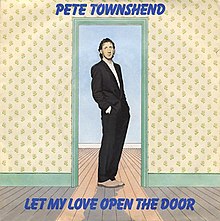
Empty Glass is the second solo studio album by English rock musician Pete Townshend, and his first composed of original material, released on 21 April 1980 by Atco Records.

White City: A Novel is the fourth solo studio album by English rock musician Pete Townshend, released on 11 November 1985 by Atco Records. The album was produced by Chris Thomas and it was recorded by Bill Price at three separate recording studios in London, England: both of the Eel Pie studios, and A.I.R.

"Ain't Nothing Like the Real Thing" is a 1968 single released by American R&B/soul duo Marvin Gaye and Tammi Terrell, on the Tamla label in 1968. The B-side of the single is "Little Ole Boy, Little Ole Girl" from the duo's United LP. The first release off the duo's second album: You're All I Need, the song—written and produced by regular Gaye/Terrell collaborators Ashford & Simpson—became a hit within weeks of release eventually peaking at number eight on the US Billboard Hot 100 and number one on the Hot Soul Singles chart, the first of the duo's two number-one R&B hits. In the UK "Ain't Nothing Like the Real Thing" reached number 34.

"Ooo Baby Baby" is a song written by Smokey Robinson and Pete Moore. It was a 1965 hit single by The Miracles for the Tamla (Motown) label.

"The Tracks of My Tears" is a song written by Smokey Robinson, Pete Moore, and Marv Tarplin. It is a multiple award-winning 1965 hit R&B song originally recorded by their group, The Miracles, on Motown's Tamla label. The Miracles' million-selling original version has been inducted into The Grammy Hall of Fame, has been ranked by the Recording Industry Association of America and The National Endowment for the Arts at No. 127 in its list of the "Songs of the Century" – the 365 Greatest Songs of the 20th Century, and has been selected by Rolling Stone as No. 50 on its list of "The 500 Greatest Songs of All Time", among many other awards. In 2021, Rolling Stone ranked the Miracles' original recording of "The Tracks of My Tears" as "The Greatest Motown Song of All Time".

"I Can't Tell You Why" is a song by the American rock band Eagles that appeared on their 1979 album The Long Run. It was written by band members Timothy B. Schmit, Glenn Frey and Don Henley. Recorded in March 1978, it was the first song finished for the album and the first Eagles song to feature Schmit on lead vocals. Released as a single in February 1980, it became a Billboard top 10 hit in April, reaching number eight on the Billboard Hot 100 and number three on the Adult Contemporary chart. It was the group's last top ten hit on the Billboard Hot 100.

"Love, Reign o'er Me", subtitled "Pete's Theme", is a song by English rock band The Who. Written and composed by guitarist Pete Townshend, it was released on 27 October 1973 as the second single from the band's sixth studio album and second rock opera, Quadrophenia. It is the final song on the album, and has been a concert staple for years. The song peaked at number 76 on the US Billboard Hot 100 and number 54 on Cash Box.
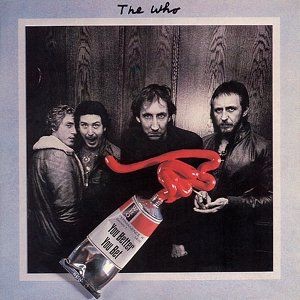
"You Better You Bet" is a song by British rock band the Who, appearing as the first track on their 1981 album Face Dances. It is sung by frontman Roger Daltrey with backing vocals from Pete Townshend and bassist John Entwistle.

"Let's Go" is a song by American rock band the Cars, written by Ric Ocasek for the band's second studio album, Candy-O (1979). A new wave rock song, the song's hook was inspired by the Routers. The song's vocals are performed by bassist Benjamin Orr.

"Babe" is a song by the American rock band Styx. It was the lead single from the band's 1979 triple-platinum album Cornerstone. The song was Styx's first, and only, US number-one single, spending two weeks at No. 1 in December 1979, serving as the penultimate number-one single of the 1970s. "Babe" also went to No. 9 on the Adult Contemporary chart. It additionally held the number-one spot for six weeks on the Canadian RPM national singles chart, charting in December 1979 and becoming the opening chart-topper of the 1980s. It was also the band's only UK Top 40 hit, peaking at No. 6. It also reached No. 1 in South Africa.

"Hello, I Love You" is a song recorded by American rock band the Doors for their 1968 album Waiting for the Sun. Elektra Records released it as a single that same year, which topped the charts in the U.S. and Canada. Although the Doors are credited as the songwriters, songs by other artists have been identified as likely sources.

"Tell It Like It Is" is a song written by George Davis and Lee Diamond and originally recorded and released in 1966 by Aaron Neville. In 2010, the song was ranked No. 391 on Rolling Stone magazine's list of The 500 Greatest Songs of All Time.

"What a Fool Believes" is a song written by Michael McDonald and Kenny Loggins. The best-known version was recorded by the Doobie Brothers for their 1978 album Minute by Minute. Debuting at number 73 on January 20, 1979, the single reached number one on the Billboard Hot 100 on April 14, 1979, for one week. The song received Grammy Awards in 1980 for both Song of the Year and Record of the Year. In 2024, the song was inducted into the Grammy Hall of Fame.

"Squeeze Box" is a song by the Who from their album The Who by Numbers. Written by Pete Townshend, the lyrics are couched in sexual double entendres. Unlike many of the band's other hits, the song features country-like elements, as heard in Townshend's banjo picking.

"More Love" is a 1967 hit single recorded by the American soul group The Miracles for Motown Records' Tamla label. The single, included on the group's 1967 album Make It Happen, later reissued in 1970 as The Tears of a Clown. Kim Carnes's 1980 cover of the song reached the Top 10 of Billboard's Adult Contemporary and Hot 100 charts.
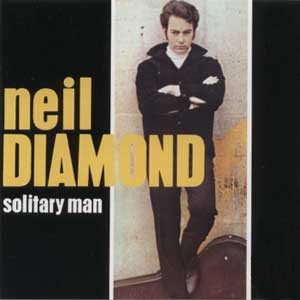
"Solitary Man" is a song written by American musician Neil Diamond, who recorded the song for Bang Records in late January 1966. It has since been covered many times, notably by T. G. Sheppard, Gianni Morandi, Chris Isaak, Johnny Cash, Ups and Downs, and HIM.

"You May Be Right" is a song written and performed by rock singer Billy Joel, released as a single and the opening track from his 1980 album Glass Houses. The single reached No. 7 on the US charts and No. 6 in Canada. It failed to chart, however, in the UK unlike his preceding and succeeding singles "All for Leyna" and "It's Still Rock and Roll to Me". The Japanese single features "Close to the Borderline" as a B-side.
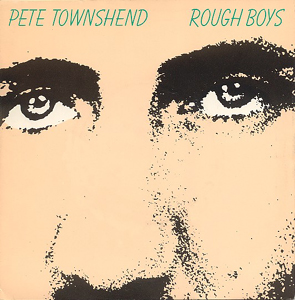
"Rough Boys" is the debut solo single written and performed by English musician Pete Townshend, released in 1980 from his second solo album Empty Glass. Known for its homoerotic lyrics, the song was a minor chart hit in both the United Kingdom and the United States.
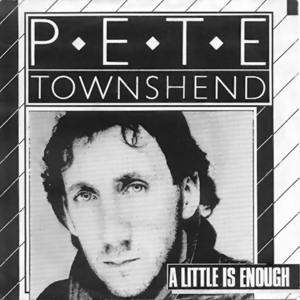
"A Little Is Enough" is a single written and performed by Pete Townshend, also known for being the guitarist for The Who. The track appeared on his album, Empty Glass.

"Jimmy Loves Mary-Anne" is a 1973 song written and composed by Elliot Lurie and recorded by Lurie's band, Looking Glass. It was the first track on their second and final album, Subway Serenade. The title has also been spelled "Jimmy Loves Mary-Ann".
